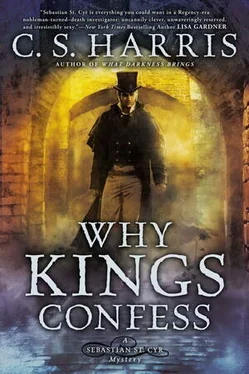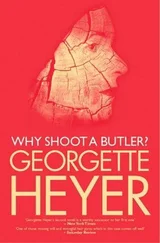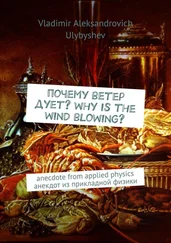C. Harris - Why Kings Confess
Здесь есть возможность читать онлайн «C. Harris - Why Kings Confess» весь текст электронной книги совершенно бесплатно (целиком полную версию без сокращений). В некоторых случаях можно слушать аудио, скачать через торрент в формате fb2 и присутствует краткое содержание. Год выпуска: 2014, Издательство: Penguin Group US, Жанр: Исторический детектив, на английском языке. Описание произведения, (предисловие) а так же отзывы посетителей доступны на портале библиотеки ЛибКат.
- Название:Why Kings Confess
- Автор:
- Издательство:Penguin Group US
- Жанр:
- Год:2014
- ISBN:нет данных
- Рейтинг книги:5 / 5. Голосов: 1
-
Избранное:Добавить в избранное
- Отзывы:
-
Ваша оценка:
- 100
- 1
- 2
- 3
- 4
- 5
Why Kings Confess: краткое содержание, описание и аннотация
Предлагаем к чтению аннотацию, описание, краткое содержание или предисловие (зависит от того, что написал сам автор книги «Why Kings Confess»). Если вы не нашли необходимую информацию о книге — напишите в комментариях, мы постараемся отыскать её.
Why Kings Confess — читать онлайн бесплатно полную книгу (весь текст) целиком
Ниже представлен текст книги, разбитый по страницам. Система сохранения места последней прочитанной страницы, позволяет с удобством читать онлайн бесплатно книгу «Why Kings Confess», без необходимости каждый раз заново искать на чём Вы остановились. Поставьте закладку, и сможете в любой момент перейти на страницу, на которой закончили чтение.
Интервал:
Закладка:
“I don’t know. But my distrust of her motives doesn’t stem only from what happened in Portugal. She’s a beautiful young Frenchwoman who attended one of the best universities in Europe. Gibson is a one-legged Irish opium eater who learned everything he knows about surgery on the world’s battlefields.”
“He’s a good man.”
“He is. But I’m not convinced Alexandrie Sauvage is the kind of woman to appreciate that. She keeps lying to us-about her father’s theft of the Dauphin’s heart, about her brother’s intentions with Lady Peter, about the fact that Damion Pelletan even was her brother.”
“Not telling you something isn’t exactly the same as lying.”
“It is in my book-at least when we’re talking about murder.”
“I can understand her lingering animosity toward you. But if she truly loved her brother. . why be so secretive?”
“I don’t know.” He glanced at the clock, set aside his wine, and rose to his feet.
She rose with him, upsetting the disgruntled cat, who arched his back and glared at Sebastian. “I still can’t believe you’re going to ask Marie-Therese about her brother’s heart in the middle of your aunt Henrietta’s soiree.”
“Not Marie-Therese; Lady Giselle. I have it on excellent authority that Marie-Therese will never condescend to speak to me again, ever since I committed the unforgivable sin of daring to contradict her royal personage. It’s one of the many hazards of believing in the divine right of kings; you start equating yourself with God, which means you see your enemies as not merely annoying or unpleasant, but the literal servants of Satan.”
“What do you expect Lady Giselle to tell you?”
“Nothing, actually. But I want to watch her face when I ask her whether or not Marie-Therese knows about the fate of the Dauphin’s heart.”
“Surely you don’t think Marie-Therese killed Damion Pelletan?”
“Do I think she personally cut out his heart? No. She and Lady Giselle were closeted in prayer that night, remember? But I’d say she’s more than capable of delegating the task to one of the hundreds of sycophants hanging around Hartwell House.”
“But. . why? Why would she want the heart of a man whose only sin was that his father performed an autopsy on a dead child?”
“Revenge? Malice? An exchange of missing body parts? I don’t know. But the connection is there, somewhere. I just haven’t found it yet.”
• • •
London might still be thin of company, but virtually everyone who was anyone appeared to have decided to attend the Duchess of Claiborne’s soiree that evening. As he pushed his way through the crowded reception rooms, Sebastian counted two royal dukes, a dozen ambassadors, and nearly enough peers to fill the House of Lords. The strains of one of Haydn’s string quartets drifted through the cavernous town house. The rendition was exquisite, although no one really seemed to be listening to it.
“Good God, Devlin,” exclaimed his aunt when she saw him. “What are you doing here?”
She was looking regal in purple satin and the magnificent Claiborne diamonds, her gray head crowned by a towering purple velvet turban sporting an enormous diamond and pearl brooch.
He bent to kiss her rouged and powdered cheek. “I was invited, remember?”
“And you turned me down. Twice. The only time you ever come to these things is when you want something.” She regarded him through narrowed eyes. “What is it now?”
He lifted a glass of champagne from a passing waiter and smiled. “Who. In this case, it’s definitely a ‘who.’ The Duchesse d’Angouleme and her devoted companion, Lady Giselle Edmondson. They are here, I assume? Your soiree was given as one of the reasons for their removal to London-that, and the theater. Although I’m told the latter is not such a draw now that Miss Kat Boleyn has inexplicitly chosen to absent herself this season.”
“Marie-Therese said that to you?”
“She did.”
“Nasty woman. I swear, if she ever does become Queen of France, they’ll have another revolution.”
“She is here, I take it?”
“She is. I saw her go down to supper just moments ago. None of the Bourbons ever miss a chance at a free meal.”
He found Marie-Therese seated on one of the brocade-covered chairs lined up against the wall of the dining room, where a buffet of delicacies had been spread to tempt the jaded appetites of the guests. She wore an elegant gown of turquoise silk with a plunging neckline designed to show off her mother’s famous drop pearl necklace; three white plumes nodded from the curls piled on her head, and she had a white ostrich-plume fan she waved languidly back and forth, although it was not hot.
He saw her stiffen, her gaze meeting his across the crowded room. Then she looked pointedly away.
Smiling faintly, he walked up to where Lady Giselle was awkwardly endeavoring to fill two plates, one for herself and one for the Princess. “Here; allow me to help you,” he said, relieving her of one of the plates.
“Thank you.” She gave him a wry, almost conspiratorial smile. “I saw the look she threw you just now. You ought by rights to be dead on the floor.”
“I’m told she’ll never forgive me. But you have?”
“I understand what you’re trying to do. I can appreciate that-even admire it-however much I might disapprove of some of your methods.”
Sebastian’s hand hovered over the nearest platters. “Crab and asparagus?”
“Yes, please.”
He added them to the plate in his hand.
She reached for a serving of shrimp in aspic. “You’ve obviously sought me out for a reason; what is it?”
Sebastian studied her still faintly smiling profile. “Somehow, I suspect you’re not going to approve of what I have to say.”
She gave a soft laugh. “Shall I undertake not to throw this plate of food at your head?”
“That might help. You see, I’ve made a rather troubling discovery. It seems that not only did Damion Pelletan’s father perform an autopsy on the boy identified as the Dauphin; he also removed and carried away with him the child’s heart. He still has it.”
She was no longer smiling. Her lips parted, two little white lines appearing at the corners of her mouth as her hand tightened so hard on the plate she held that he wondered it didn’t crack. “I did not know that. Are you certain?”
If she were an actress, she was a world-class one. Sebastian said, “I’m told he keeps it in a crystal vase in his study. Why would he do that?”
She reached for a bread roll. “It has long been the practice in France to preserve the internal organs of the royal family separately from their bodies. The burial of the royals’ remains typically took place at the basilica of Saint-Denis. But their hearts and entrails were willed to various places. The previous Dauphin of France had his heart buried at Val-de-Grace, along with those of scores of other kings and queens and princes of the blood.”
Sebastian wondered if she’d heard of the fate of those hearts during the Revolution. Their precious silver and gold reliquaries torn open and sent to the mint to be melted down, the hearts were put into a wheelbarrow and burned-except for a few that were sold to painters, who liked to use the dried organs to create a special rare red-brown pigment known as “mummia.”
He said, “So you’re suggesting-what? That Dr. Philippe-Jean Pelletan was a royalist? That he took the Dauphin’s heart so that even if his body were consigned to a common grave, his heart might at least be preserved?”
“I don’t know Dr. Pelletan’s politics. But he has managed to hold on to his position at the Hotel-Dieu in Paris through the Revolution, the Directory, and now Napoleon’s empire. Whatever his opinions, he is obviously most adept at keeping them to himself.”
Читать дальшеИнтервал:
Закладка:
Похожие книги на «Why Kings Confess»
Представляем Вашему вниманию похожие книги на «Why Kings Confess» списком для выбора. Мы отобрали схожую по названию и смыслу литературу в надежде предоставить читателям больше вариантов отыскать новые, интересные, ещё непрочитанные произведения.
Обсуждение, отзывы о книге «Why Kings Confess» и просто собственные мнения читателей. Оставьте ваши комментарии, напишите, что Вы думаете о произведении, его смысле или главных героях. Укажите что конкретно понравилось, а что нет, и почему Вы так считаете.












